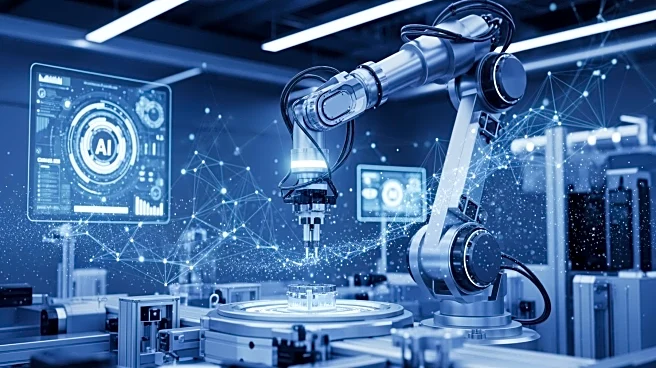What's Happening?
The AI Productivity Cycle is revolutionizing the manufacturing industry by integrating artificial intelligence with a comprehensive digital infrastructure. This cycle consists of three phases: Discover,
Enrich, and Amplify, which collectively enhance the digital thread connecting all stages of a product's lifecycle. The Discover phase utilizes AI to unlock hidden insights from data, enabling rapid identification of issues and proactive risk assessment. The Enrich phase expands the digital thread by connecting more systems and incorporating overlooked dimensions of product knowledge. Finally, the Amplify phase accelerates innovation through AI-driven design and scenario planning, optimizing performance and sustainability.
Why It's Important?
The AI Productivity Cycle offers significant benefits to the manufacturing sector by streamlining processes and enhancing decision-making capabilities. By leveraging AI, manufacturers can quickly address quality challenges, supply chain disruptions, and sustainability requirements. This approach enables organizations to transition from reactive to predictive models, improving operational efficiency and competitiveness. The cycle's focus on continuous improvement and learning positions manufacturers to adapt swiftly to market changes, potentially redefining industry standards and practices. As AI becomes more integrated into manufacturing, companies may experience increased innovation and reduced time-to-market for new products.
What's Next?
Manufacturers adopting the AI Productivity Cycle may need to invest in digital infrastructure and AI technologies to fully realize its benefits. This could involve training personnel to work with AI systems and developing strategies to integrate AI insights into decision-making processes. As the cycle gains traction, industry leaders may collaborate to establish best practices and standards for AI integration. Additionally, regulatory bodies may explore guidelines for AI usage in manufacturing, addressing concerns related to data security and ethical considerations. The ongoing evolution of AI technologies may lead to further advancements in manufacturing processes and capabilities.
Beyond the Headlines
The AI Productivity Cycle's emphasis on sustainability and efficiency could have broader implications for environmental responsibility in manufacturing. By embedding sustainability data into the digital thread, organizations can optimize operations to reduce their carbon footprint. This focus on sustainability may influence industry-wide shifts towards greener practices and products. Furthermore, the cycle's ability to enhance resilience and adaptability could impact global supply chains, promoting stability and reducing vulnerability to disruptions.












